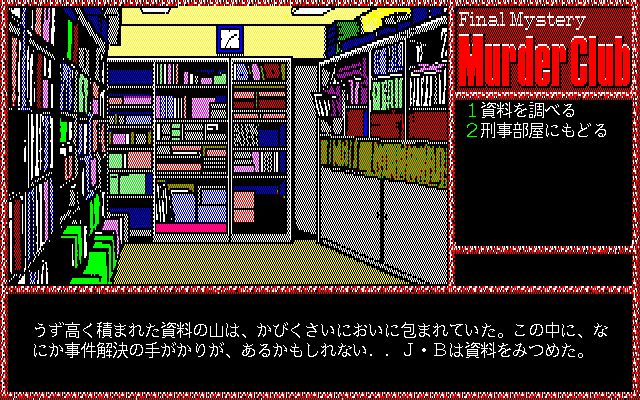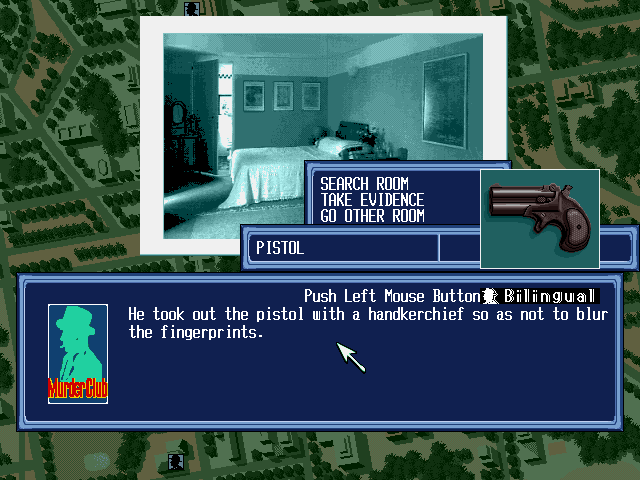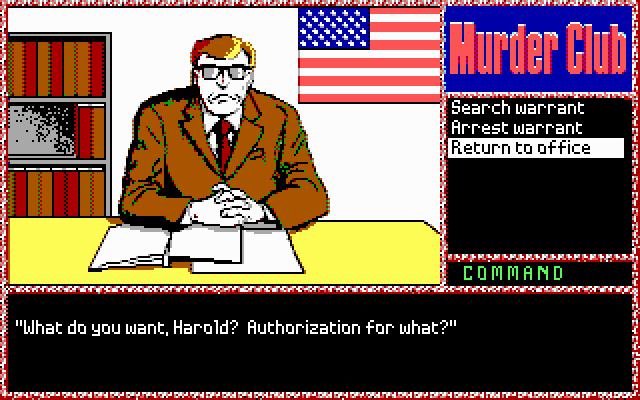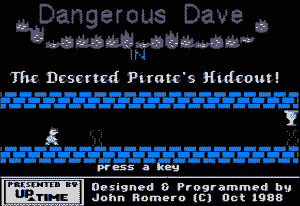Retro Replay Review
Gameplay
Murder Club delivers a methodical and immersive detective experience by putting you in the shoes of private investigator J.B. Harold. The core gameplay loop revolves around exploring crime scenes, collecting clues, and piecing together evidence in a manner that feels both authentic and satisfying. There’s no hand-holding: you’ll need to search every drawer, photograph every suspicious item, and cross-reference testimony with physical proof to move the case forward.
(HEY YOU!! We hope you enjoy! We try not to run ads. So basically, this is a very expensive hobby running this site. Please consider joining us for updates, forums, and more. Network w/ us to make some cash or friends while retro gaming, and you can win some free retro games for posting. Okay, carry on 👍)
The interrogation sequences stand out as a highlight. Conversations with suspects are dynamic, offering branching dialogue options that can alter the flow of information. Choosing the right questions or pressing inconsistencies at the right moment rewards you with new leads, while missteps can close off critical lines of inquiry. This trial-and-error aspect adds tension and replay value, as you learn to calibrate your approach to each unique personality.
The simulation elements come to life through an in-game case file, where you manually organize evidence, timeline entries, and suspect profiles. This digital binder reinforces immersion by making you feel responsible for every piece of information. Although the process can be meticulous, it never drags; the pacing keeps you motivated to uncover the next breakthrough and inch closer to unmasking the killer of Bill Robbins.
Graphics
Visually, Murder Club opts for a realistic art style that emphasizes atmospheric lighting and detailed environments. Crime scenes are rendered with a keen eye for detail: blood spatter patterns, fingerprints, and discarded personal items all appear crisp and clear, aiding in your investigation. The muted color palette reinforces the noir mood, making the world feel both lived-in and slightly ominous.
Character models are expressive enough to convey subtle shifts in emotion during interviews, though they occasionally suffer from stiff animations in less critical cutscenes. Facial expressions during key revelations, however, manage to capture surprise, guilt, or indignation, which adds depth to the interrogation segments. Background characters in public spaces, like hotel lobbies or corporate offices, contribute to a sense of scale without overcrowding the scenes.
The user interface is clean and intuitive: evidence pops up with high-resolution close-ups, and your case file tabs are easy to navigate. Transition animations between investigation modes, such as moving from scene exploration to suspect interviews, are smooth and maintain immersion. While not a graphical powerhouse by modern blockbuster standards, Murder Club’s visuals serve the story and gameplay exceptionally well.
Story
At the heart of Murder Club lies a tightly woven narrative centered on the mysterious death of wealthy businessman Bill Robbins. As J.B. Harold, you’re introduced to a web of intrigue involving corporate rivalries, hidden affairs, and long-buried grudges. Each suspect you encounter carries a convincing backstory, and the dialogue writing does an admirable job of making motivations feel genuine rather than contrived.
The pacing of the story strikes a careful balance between methodical clue gathering and narrative progression. Early on, you’ll piece together small details—like a torn business contract or a concealed love letter—that hint at deeper conspiracies. Mid-game revelations often shift your suspicion from one character to another, keeping the investigation fresh and players constantly reevaluating their theories.
While the central whodunit remains engrossing, the game also sprinkles in personal moments for J.B. Harold, offering glimpses of his professional ethics and personal doubts. These character beats elevate Murder Club above a standard mystery template, lending emotional weight to courtroom scenes and final confrontations. By the time you stand before the judge, you’ll feel intimately connected to both the victim and the accused.
Overall Experience
Murder Club is a rewarding journey for fans of detective fiction and procedural simulations. The game’s emphasis on realistic investigative work means you rarely feel railroaded; instead, every clue you uncover is a testament to your own deduction skills. For players who enjoy piecing together puzzles at a deliberate pace, this title offers hours of engrossing gameplay without relying on artificial action sequences.
Some may find the level of detail demanding, especially if they’re used to more action-oriented adventures. However, patience is rewarded here: the sense of accomplishment when you finally expose the killer or corner a suspect in court is genuinely thrilling. The branching dialogue and multiple red herrings also encourage replayability, as you can experiment with different interrogation tactics or focus on alternative clues.
In summary, Murder Club stands out as a thoughtful, well-crafted detective adventure. Its combination of in-depth simulation mechanics, moody visuals, and a compelling storyline creates an immersive detective experience. Whether you’re a veteran sleuth seeking a new challenge or a mystery newcomer curious about investigative gameplay, Murder Club is well worth your attention.
 Retro Replay Retro Replay gaming reviews, news, emulation, geek stuff and more!
Retro Replay Retro Replay gaming reviews, news, emulation, geek stuff and more!









Reviews
There are no reviews yet.